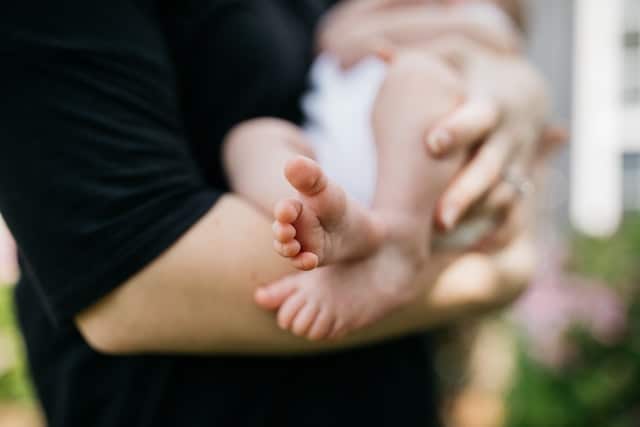This post you are about to read is a complete guide on babies and mirror superstitions. Our team has researched the different myths, folklores, and superstitions about babies looking in mirrors. And in this comprehensive post, we present our findings to you.
What are the superstitions about a baby looking in the mirror? Many cultures around the world believe that babies should not look into mirrors until they cross certain age or developmental milestones. This belief stems from age-long myths that differ from one culture to another. One such myth is that souls can become trapped inside a mirror. Other superstitious beliefs about babies and mirrors include babies remembering past births; suffering physical harm, such as crooked teeth, toothaches, or tummy aches; developing certain disabilities, such as stuttering; or dying.
These superstitious beliefs are not proven by any scientific evidence and are likely untrue. But many people believe them. More so, many people have observed that their babies cry and throw tantrums whenever they look in a mirror. But then, others say looking in a mirror is one of their babies’ favorite things to do. As you read on, we will share all of the babies and mirror superstitions we know of and examine the different sides of the argument on these superstitions.
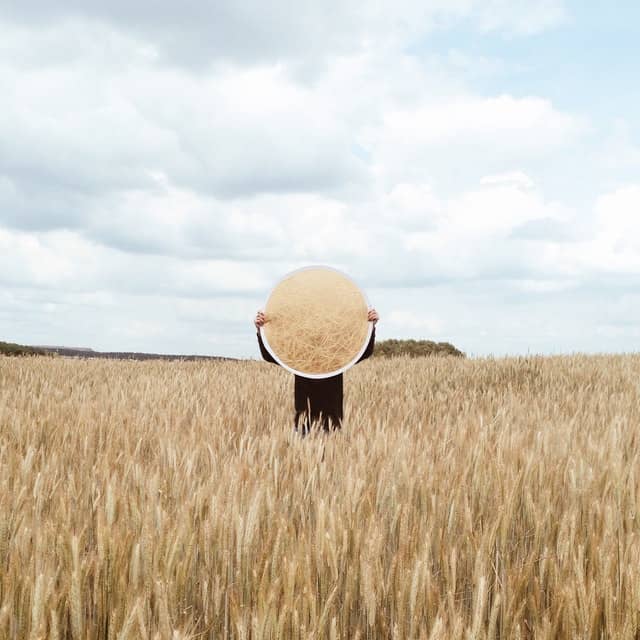
The Different Superstitions of Baby Looking in the Mirror
None of the superstitious beliefs about babies and mirrors support babies looking in mirrors. Some cultures believe that babies that look in the mirror before their first birthday may become obsessed with themselves and develop narcissistic tendencies. But other cultures believe the consequences of babies looking in the mirror are more serious than that.
In some cultures, the belief is that when babies look in a mirror, an evil spirit will look back at them and they may die as a result. Some others say the soul of the baby will become trapped in the mirror. Others talk of the dangers of physical harm or disabilities, among other things as consequences of babies looking in a mirror.
It is not strange that there are many superstitions and myths about babies and mirrors. Mirrors are among the common objects of superstitious beliefs across diverse cultures. This is likely because, for a very long time, humans didn’t understand how mirrors work.
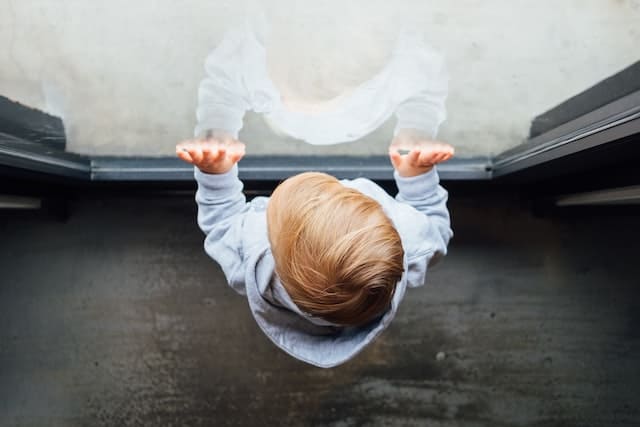
People were amused that they could see their faces and other things in the surrounding in a mirror. They often wondered if a parallel (or spirit) world exists in the mirror. This thought was the source of fear and all the scary stories about mirrors and babies, as well as other mirror superstitions. Some of the common babies and mirror superstitions are as follows:
The Baby’s Soul Will Get Trapped in the Mirror
Some cultures, including Greek mythology, believe that a parallel spirit world exists in mirrors or that mirrors can be doorways into the spirit world. As such, they think that when the tender soul of a baby gazes into this spirit world, the soul will get trapped in it and won’t be able to come out.
This soul-trap superstition is the reason why some societies cover all mirrors in the house whenever anyone dies. They believe doing this will prevent the soul of the dead person from getting trapped in one of the mirrors in the house.
Baby Looking in Mirror Can cause Death
Some cultures fear that looking in any mirror before a baby turns one will cause the baby to die. This superstition is an old American and European superstition, but we have heard of it in some other cultures too. The superstitious belief was so common that Clifton Johnson wrote about it in his 1896 book, titled “What they say in New England”. And many people believed it, so much so that nurseries usually had no mirrors or any reflective surface inside the room.
This superstition was likely an attempt to curb the high death rate of babies at that time. But in retrospect, it seems babies were dying a lot at that time because there were no vaccines and antibiotics, or other medical technologies available today. Sudden Infant Death Syndrome was also common at the time, and that could have contributed to the superstitions.
The Devil Can Stare at Babies from a Mirror
In Jamaica, as well as other Caribbean countries, it’s a common belief that if babies look into the mirror, the devil may stare back at them. This is the same reason why these cultures believe that if children see their shadows, an evil spirit or ghost will begin to follow them.
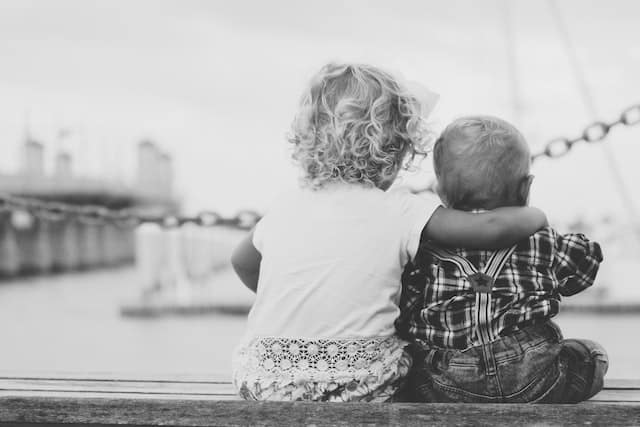
Myths about Babies’ Previous Lives and Mirror
An old-time Indian superstition, which is also common among some other cultures, is that mirrors bring back memories from a baby’s past life. Superstitions around mirrors and past life memories seek to explain why babies cry when they look in a mirror. Some superstitions even say that a baby will forget his life’s purpose and fail to fulfill it when he sees a mirror too early.
This belief stems from the myth of reincarnation, which holds that when a person dies, the soul will go somewhere else to be born as a little child. Here are some of the known myths about babies’ previous lives and mirrors:
Looking in a Mirror Will Remind Babies of their Previous Life
This superstition says that it takes some time for babies to fully understand their new birth. So when you allow the child to see himself or someone else in a mirror, he would quickly realize that there are new realities around. The superstition also says the child will start remembering his old birth and relatives from his previous life. These, according to the superstitious belief, will make the child cry badly.
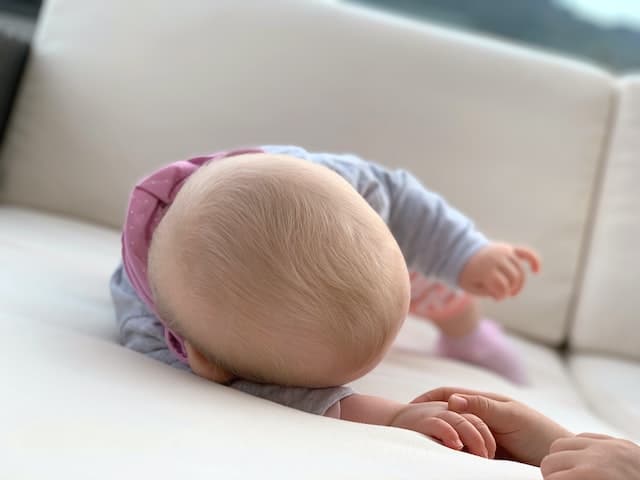
Babies Forget Their Life’s Purpose When They Look in a Mirror
This superstition is similar to the last one and stems from the same belief that babies are adult spirits that reincarnate after death from a previous life. Those who hold to this superstition also believe that looking in a mirror can remind babies of their previous life. But according to this belief, if babies are reminded of their past life too early, they may forget their life’s purpose and fail to accomplish it.
This superstition says that for children to fulfill their life’s purpose, they must think their current life is the only one they have ever lived. The knowledge of another life will confuse them, erase the memories of their life’s mission, and ultimately prevent them from fulfilling it. You can also check out this article that talks about what happens when two mirrors face each other.
✅ Video – Origins: Superstitions – Mirrors
In this video, Mitch Horowitz, the author of Occult America explains the origins of various superstitions about mirrors. He talks about babies and mirror superstitions, among others. If you want to know where some of these superstitions came from, click the play button below.
Superstitions about How Mirrors Affect a Baby’s Development
Pride, twisted teeth, and stuttering are among the different resultant effects people fear could happen to a baby that looks into a mirror. Superstitions around these fears cut across the Indian, Jewish, Pennsylvania German, and Jamaican cultures, among others.
Let’s take a closer look at these different superstitions:
Looking at Self in Mirror Will Make a Child Proud and Narcissistic
Some cultures say that a baby should not be looking at himself or herself in the mirror before the first birthday. The common belief in the 1800s and 1900s in Europe was that babies who start seeing their reflection too early will grow up as horrible persons with narcissistic tendencies. Some people even believed that such a child will end up being a thief or a scoundrel.
We found an 1889 record of Pennsylvania German folklores that contained this superstition. Another similar belief is an old Jewish fable that suggests children will become proud when they are allowed to see themselves in the mirror too early.
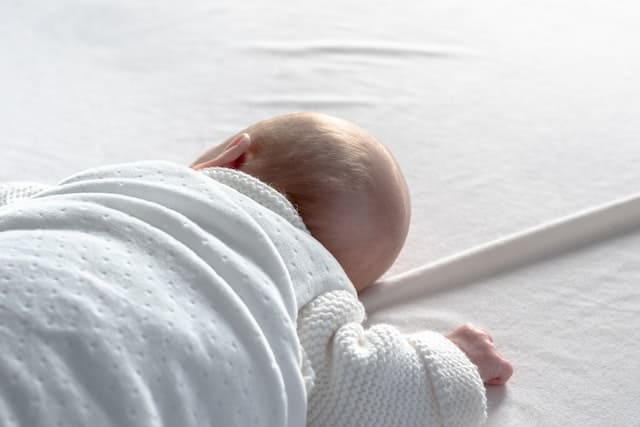
If you believe these superstitions, you should keep mirrors away from your baby. But if you don’t mind, you can go ahead and have your baby look in the mirror. The mirror reflections will not affect your child spiritually, mentally, or physically.
Looking in Mirror before Teething Will Cause Twisted Teeth
In India and some other cultures, it’s a common myth that kids will develop twisted teeth if they look inside a mirror before teething. As such, parents in these cultures often avoid exposing their kids to mirrors to ensure that their teeth will grow in the proper shape.
Mirror Reflections Can Make Babies Stutter When They Grow Up
Some old Jewish fables say babies should only be allowed to look in mirrors after they start talking. This fable says that a baby will stutter when they grow up if they start seeing mirror reflections too early. We have also shared this article titled, why can’t babies look in the mirror? You can check out the article for more tips and information.
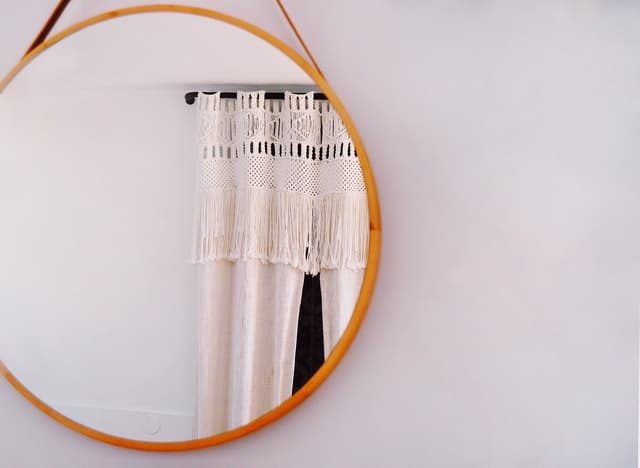
 on Pexels
on PexelsWill Mirrors Actually Harm Your Baby?
Unlike what the superstitions say, mirror reflections will not affect your baby’s development or steal his or her soul away. Looking into a mirror will also not kill your child. What science says is that newborn babies don’t care about mirror reflections because they can’t recognize themselves or other people yet. What newborns see when they look in a mirror are just motions and colors. However, if you are careless with mirrors around your baby, the broken glass can injure your baby.
Should You Keep Mirrors Away from Your Baby?
There are a few reasonable reasons why you may want to keep mirrors away from your baby. Some of these reasons are as follows:
Reflections are Not Good for Baby’s Eyes
Reflections, especially from a close range are not good for babies’ eyes. As such, you should not allow your baby to stare at mirrors, TVs, phones, computers, or any source of reflection from a close range.
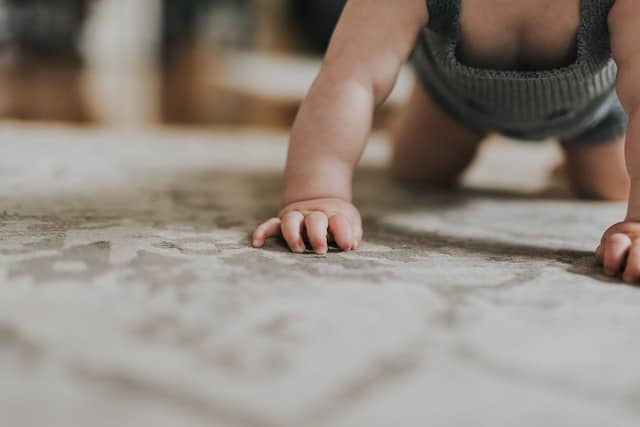
What’s more, children’s eyes are quite sensitive to lights and reflections. So while showing the mirror to a baby, be careful of light reflections. If you mistakenly direct high-beam light reflections to the baby’s eyes through the mirror, it may cause permanent damage to the baby’s eyesight. Such sudden or high reflections can make the child blind forever.
Broken Glass Can Injure Your Baby
If you hand over a glass mirror to your baby, it may break and injure your baby. Glass substances are generally dangerous for children, so this risk is also not specific to mirrors only. As such, if you will ever hand a glass material to your baby, you should closely monitor what’s going on. If not, the baby may innocently misuse or break it and wound himself.
Some of the superstitions may have originated to prevent this risk. However, nowadays, some baby toys have built-in mirrors. There are also small unbreakable mirrors that babies can safely play with. Just make sure what you have is an unbreakable mirror before you give it to your baby. We have also shared this article on how to dispose of a mirror without bad luck. You can check out the article for more information.
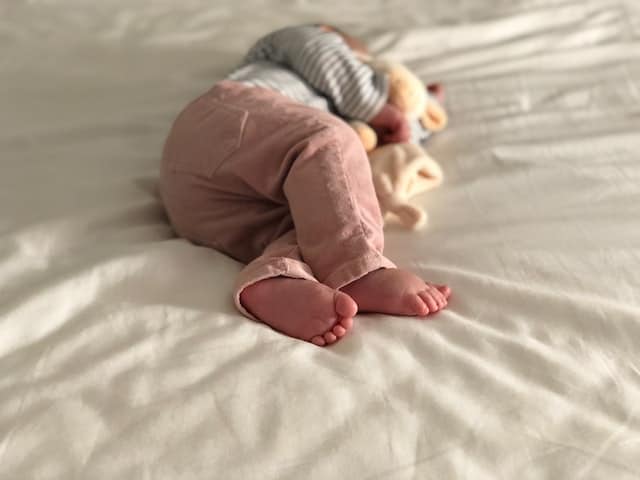
Do Mirrors Make Babies Cry Because the Superstitions are True?
Babies sometimes cry when they look in the mirror but that’s not because a devil is staring back at them. Some babies cry because they are still scared of seeing “new faces”. This is a phase that every newborn passes through, where they are scared of faces other than that of their dad, mum, and others in the household. The baby does not yet recognize himself so he reckons his face as a new face and becomes scared.
If you notice that your baby cries when he looks into a mirror, don’t panic. It’s likely not a result of any superstitious belief. But then, if you hold strongly to any of the superstitions and keeping your child away from mirrors will give you peace of mind, do so.
Why Do Mirrors Make Babies Cry?
Aside from being scared of a new face, babies sometimes cry when they look in the mirror because they are trying to hold the “person” they are seeing but they can’t get through the mirror. This “frustration” can sometimes make a baby cry.
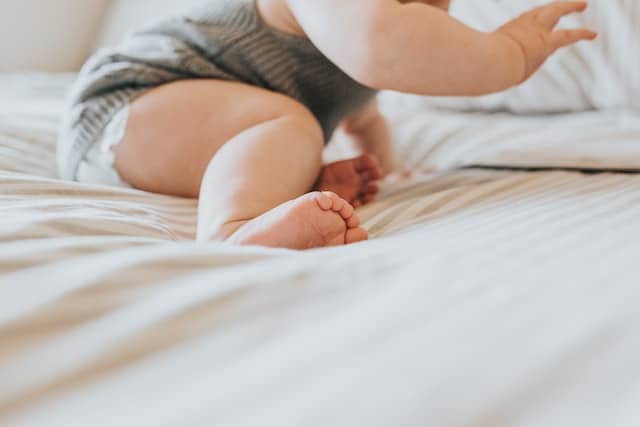
Another reason why babies cry when they look in the mirror is jealousy. Babies may become jealous when they see another baby because they don’t want to share their parent’s attention. So when a baby sees another baby in the mirror, not realizing it’s his image, he may become jealous and possessive and may begin to cry.
So, from a pragmatic point of view, a baby does not cry because of any of the bad reasons superstitions suggest. Some psychologists have even said that mirrors are good for toddlers. So if you can look beyond the superstitions, you can allow your toddler to look into mirrors or do “mirror play”.
Beyond The Superstitions: Why are Mirrors Good for Toddlers?
Beyond the superstitions, toddlers are amused and become very playful when they see themselves in a mirror. Mirrors can also be a great learning tool for toddlers. They can help your toddler develop his vocabulary, as well as help with the practice of visual tracking.
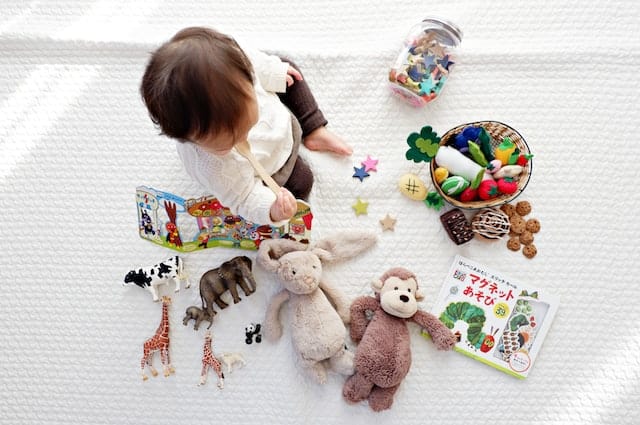
The Enjoy Seeing Faces in Mirrors
The first time a baby sees another baby, they become amused and enjoy playing with the other baby. This also happens when babies see their image in a mirror. It seems that toddlers love to see human faces more than even toys. So you can let your kid enjoy the funny moment when he is trying to play with his image in the mirror. If you are looking for a safe mirror for your baby to play with, we recommend this mirror developmental baby toy.
You can even make a few videos to keep the good memories for when your child grows up. You can also check out this article that we have written about broken mirror symbolism. We have shared an in-depth discussion about the topic.
✅ Video – Priceless Reactions of Babies; Mirrors – The Funniest Baby Videos
This video shows the reaction of several babies when they see themselves in a mirror for the very first time. Some of the reactions you will see include babies who laughed, those who tried to escape, and every reaction in between. The video is so much fun to watch.
Mirrors Help Toddlers to Explore Their Faces
Mirrors are great tools for babies to explore their faces. So you can sit your baby on your lap and hold a mirror in front of him. Over time, the baby will begin to recognize that that’s his face and begin to explore the image to see what they look like. This can help develop your baby’s self-awareness and confidence. We have also shared this article titled, what to do if a mirror is broken in a home? You can check out the article for more tips and information.
Mirrors Can Help Develop Your Toddler’s Vocabulary
While your baby is looking at himself in a mirror, you can seize the opportunity to develop the baby’s vocabulary. Call out the names of the different body parts and point at them as the baby looks in the mirror. That way, the baby will begin to learn what each part is called.
Mirrors Can Help Your Toddler Practice Visual Tracking
Another great thing you can do with mirrors is to help your toddler practice visual tracking. To do this, you can make funny faces at the baby while behind him, with a mirror in front. The baby would see the funny faces you’re making through the mirror and may imitate them or make different facial expressions back. You can check out this mirror activity toy that is ideal for helping your baby practice visual tracking. It is made from safe materials so you can rest assured that your baby is safe.
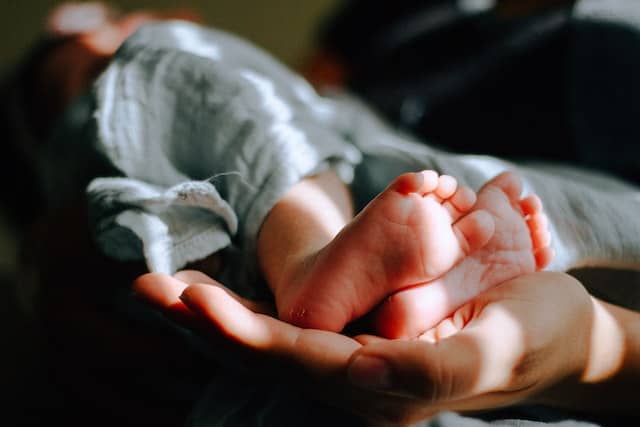
Can Mirror Play Help a Babies Development?
Mirror play can help the development of a baby. By looking at the mirror, babies can learn how to focus on their eyes, learn about their facial expressions, and following images. Moreover, the smiling and blinking reflection of the baby in the mirror is helpful to their social and emotional milestone.
Do Babies Love Looking at Themselves in the Mirror?
Babies love looking at themselves in the mirror. They also love playing with faces when they look in the mirror. Looking at their reflection in the mirror is also helpful for their motor and language. Babies can learn to identify familiar faces and develop muscles when they reach toward their reflection in the mirror.
Do Babies Recognize Themselves in Mirrors?
Babies don’t recognize themselves in mirrors until they are about 18-24 months old. However, by the age of 3 months, babies can recognize that they are looking at a person in the mirror. But they often think it’s some other baby they’re seeing inside the mirror. Before 3 months, all that your babies see when they look at mirrors are motions and colors.
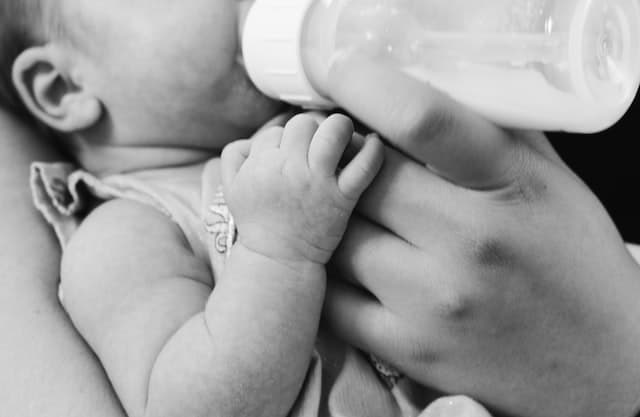
Kids develop at different rates, but they all go through similar developmental stages. Young infants (0-3 months old) look at mirror images but they don’t see a person. Rather, they see motions and colors. At 3-6 months when they start recognizing that it’s a person’s face they’re seeing, they start to enjoy standing before a mirror.
Older infants (6-18 months old) smile more at mirror images and make sounds when they look at the images. Toddlers (15-36 months old) show self-recognition and may start touching their faces and other body parts that they see in the mirror.
Why Do Babies Love Mirrors?
Babies love mirrors and are usually attracted to them because mirrors are bright and shiny. But beyond that, babies start enjoying looking at mirrors as soon as they start recognizing that what they see is human reflection. It’s even more fun for toddlers when they recognize that what they see is their faces. You can also check out this article that we have written titled, Mirror mirror on the wall – original and pop culture. Learn more about mirrors and how they are used in pop culture.
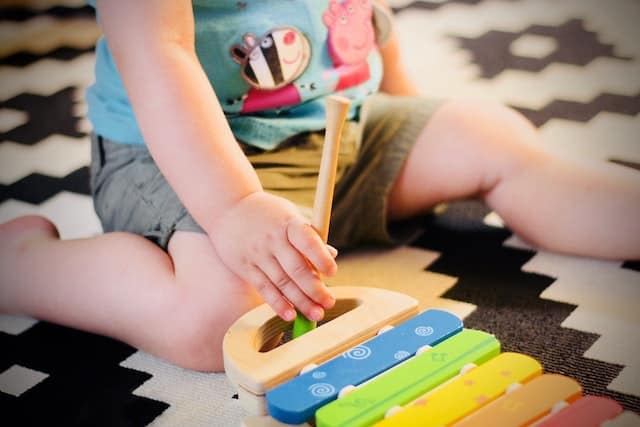
Why You Shouldn’t Let Babies Watch TV?
Watching TV or any other source of reflection from a close range can permanently damage a baby’s eyesight. More so, evidence shows that viewing screens (TV, phone, or computers) before the baby clocks at 18 months can have several lasting negative effects. These include problems in areas such as language development, memory, and reading skills. Experts say screen viewing can also contribute to attention and sleep problems.
What babies need in the initial stages of their development are direct interactions, rather than virtual images from screens. They should interact with things they can touch and feel. Experts say that virtual interactions do not contribute to or translate into any real-world experience or learning for children below 18 months.
Conclusion
This post has covered everything we know about babies and mirror superstitions. We have covered various cultures and diverse superstitious beliefs. But beyond the superstitions, we explained from a pragmatic point of view, why mirrors may be helpful or harmful for your baby. We hope you found the information helpful, and that you can decide what works best for you as regards your babies and mirrors.
